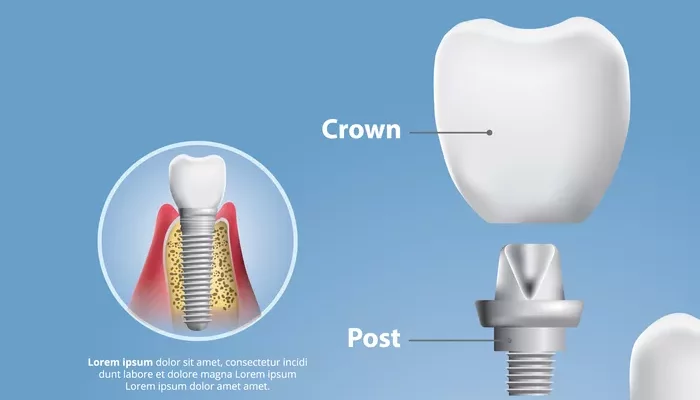Dental implants are a popular and effective solution for replacing missing teeth. They provide a permanent and natural-looking alternative that can significantly improve a person’s quality of life. However, like natural teeth, dental implants require proper care and maintenance to ensure their longevity and functionality. This article will discuss the general care for dental implants, including daily hygiene practices, regular dental visits, dietary considerations, and more.
Understanding Dental Implants
1. What Are Dental Implants?
Dental implants consist of three main components:
Implant Post: A titanium post surgically placed into the jawbone. This post serves as the root of the missing tooth.
Abutment: A connector placed on top of the implant post. It holds the crown securely in place.
Crown: The visible part of the implant that looks like a natural tooth. It is custom-made to match the surrounding teeth.
2. Why Proper Care Is Important
Proper care for dental implants is essential for several reasons:
Longevity: With appropriate care, dental implants can last a lifetime.
Prevention of Complications: Good oral hygiene can prevent infections and complications like peri-implantitis, an inflammatory condition affecting the soft and hard tissues around the implant.
Aesthetic Appeal: Proper care keeps the crown looking good and functioning well, maintaining a natural smile.
Daily Care for Dental Implants
1. Oral Hygiene Practices
Maintaining excellent oral hygiene is crucial for the health of dental implants. Here are some daily care practices:
Brushing
Frequency: Brush your teeth at least twice a day, just like natural teeth.
Technique: Use a soft-bristled toothbrush and gentle circular motions. Pay special attention to the area around the implant and the gum line.
Toothpaste: Use fluoride toothpaste to help protect your natural teeth and implant crown.
Flossing
Daily Flossing: Floss at least once a day to remove food particles and plaque from between teeth and around the implant.
Flossing Aids: Consider using specialized floss or interdental brushes designed for dental implants to make cleaning easier.
Mouthwash
Antimicrobial Mouthwash: Use an antimicrobial mouthwash to help reduce bacteria in the mouth. This can be particularly beneficial around the implant area.
2. Special Considerations for Implants
Avoid Hard or Sticky Foods
Hard Foods: Avoid biting into hard foods like ice, hard candies, or nuts, as they can damage the crown.
Sticky Foods: Be cautious with sticky foods like caramel or taffy, which can pull on the crown and potentially dislodge it.
Smoking Cessation
Impact of Smoking: Smoking can negatively affect the healing process and increase the risk of complications. If you smoke, consider quitting to improve your oral health and the longevity of your implants.
Regular Dental Visits
1. Importance of Routine Checkups
Regular dental checkups are essential for maintaining the health of dental implants. Here’s why:
Professional Cleaning: Dental professionals can perform deep cleanings to remove plaque and tartar that regular brushing and flossing might miss.
Monitoring: Regular visits allow your dentist to monitor the condition of your implants and surrounding tissues, ensuring everything is healthy.
Early Detection: Routine checkups can help identify potential issues early, such as signs of infection or bone loss.
2. Frequency of Visits
General Recommendation: Visit your dentist every six months for routine checkups and cleanings. Your dentist may recommend more frequent visits if you have specific concerns or a history of gum disease.
Managing Potential Issues
1. Recognizing Signs of Trouble
Being aware of potential problems can help you address issues before they become serious. Look out for:
Pain or Discomfort: Persistent pain around the implant may indicate infection or other complications.
Swelling or Redness: Swelling or redness around the gum line can be a sign of inflammation or infection.
Mobility: If the crown feels loose or wobbly, contact your dentist immediately.
2. What to Do If Problems Arise
Contact Your Dentist: If you notice any signs of trouble, schedule an appointment with your dentist as soon as possible.
Follow Instructions: If your dentist provides specific care instructions or treatment plans, be sure to follow them closely.
Dietary Considerations
1. Nutrition for Healthy Implants
A balanced diet plays a significant role in maintaining overall oral health and the longevity of dental implants. Consider the following:
Calcium and Vitamin D: These nutrients are essential for bone health. Include dairy products, leafy greens, and fortified foods in your diet.
Protein: Adequate protein intake supports healing and tissue repair. Include lean meats, fish, eggs, legumes, and nuts in your meals.
Hydration: Drink plenty of water to help maintain saliva production, which is essential for oral health.
2. Foods to Avoid
Certain foods can jeopardize the health of your dental implants:
Sugary Foods: Limit sugary snacks and beverages, as they can contribute to plaque buildup and gum disease.
Acidic Foods: Highly acidic foods and drinks can erode enamel and irritate gums. Rinse your mouth with water after consuming such items.
Lifestyle Changes for Better Oral Health
1. Stress Management
Stress can lead to habits like teeth grinding (bruxism), which can damage dental implants. Consider the following:
Relaxation Techniques: Practice stress-relief techniques such as yoga, meditation, or deep-breathing exercises.
Night Guards: If you grind your teeth at night, ask your dentist about a custom night guard to protect your implants.
2. Avoiding Teeth Grinding
If you suspect you grind your teeth, discuss it with your dentist. They can provide strategies to manage this habit and protect your dental implants.
Conclusion
Caring for dental implants is crucial for their longevity and functionality. By following a daily oral hygiene routine, attending regular dental checkups, and making mindful dietary choices, you can ensure that your dental implants remain healthy and effective for years to come. Being proactive about your oral health will not only protect your investment in dental implants but also enhance your overall quality of life. If you have any questions or concerns about caring for your dental implants, don’t hesitate to reach out to your dental professional for personalized advice and guidance.
Related topics:

